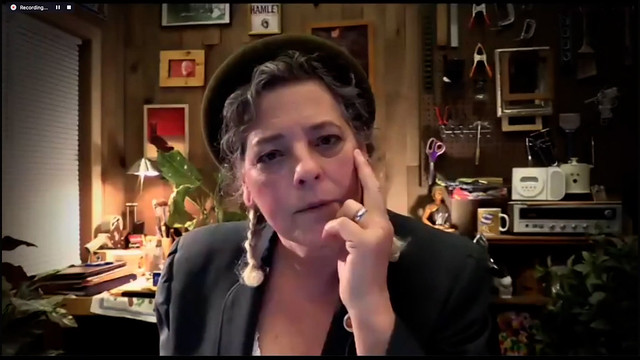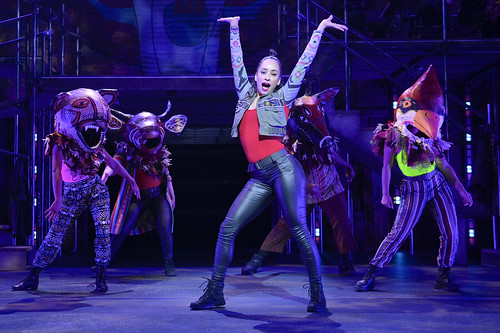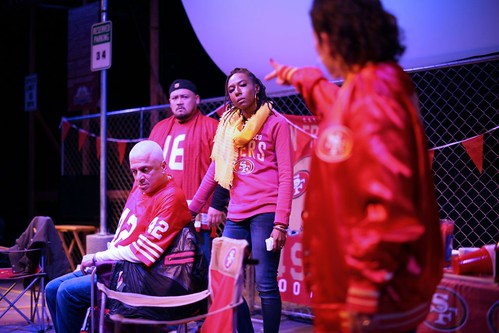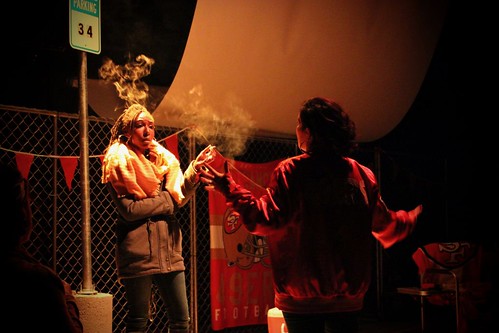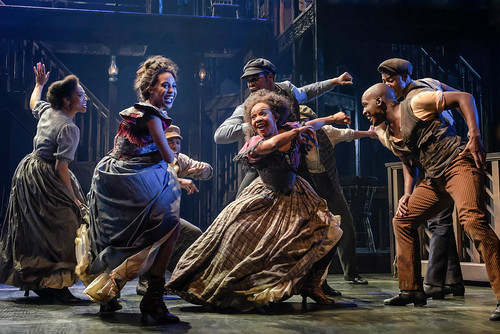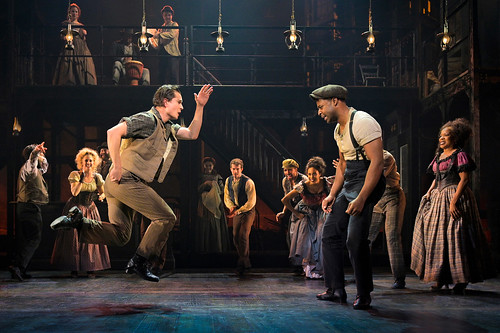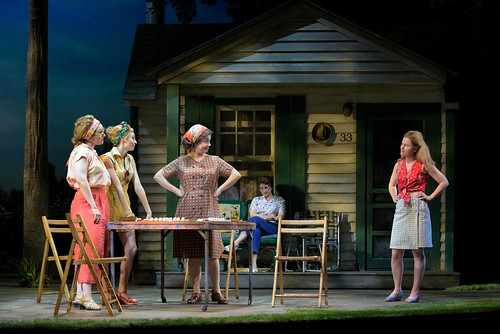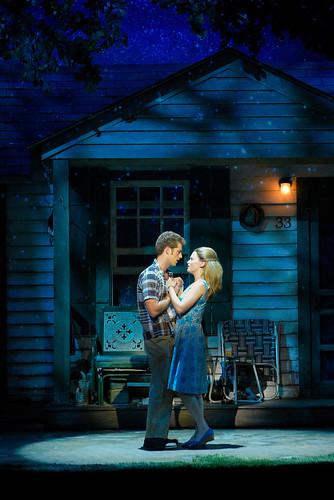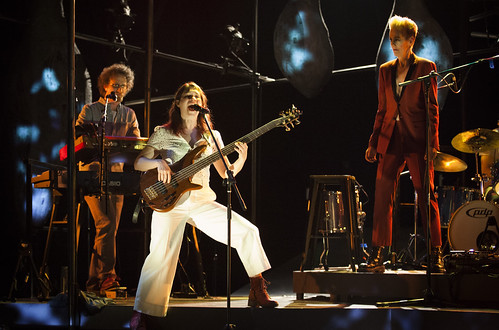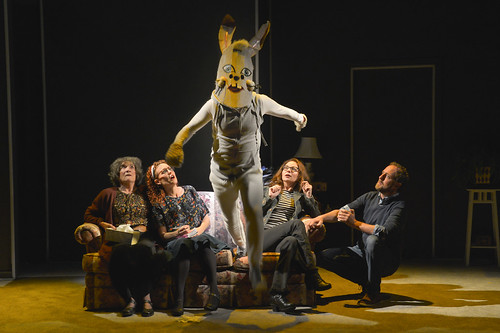
The cast of Berkeley Rep’s world-premiere play Imaginary Comforts, or The Story of the Ghost of the Dead Rabbit includes (from left)Sharon Lockwood as Mrs. Gold, Marilee Talkington as Naomi, Danny Scheie as the Ghost, Susan Lynskey as Sarah Gold and Cassidy Brown as Michael. Below: Talkington (left) and Lynskey star in the new play by San Francisco writer Daniel Handler, also known as Lemony Snicket. Photos courtesy of Kevin Berne/Berkeley Repertory Theatre
The first time I heard the title for the new play by Daniel Handler, the San Francisco writer behind the popular Lemony Snicket books, I was confused. Imaginary Comforts, or The Story of the Ghost of the Dead Rabbit is the title, and it wasn’t the Snickety-y subtitle that perplexed me. It was the notion that comfort could be imaginary. Isn’t comfort comforting no matter where it comes from? You can receive comfort from an external source (a parent, a pet, a narcotic) or you can just imagine comfort (memory, dream, hallucination), but as long as you are comforted, job done…at least for a little while, right?
Surely seeing the play would help me understand the title, but no such luck. Imaginary Comforts opened Thursday at Berkeley Repertory Theatre’s Peet’s Theatre in a slick world-premiere production directed by Tony Taccone and featuring a cast that boasts some of the best actors the Bay Area has to offer. The play itself seems confused about its comedy, its sincerity, its theatricality. It’s kind of like an imaginary play that may one day find its reason for being – and at one point a character questions the notion of imaginary comfort, which made me want to stand up and shout, “Yes! That!”
Fractured time and narrative make the play something of a puzzle, which is nicely reflected in the hyperkinetic set by Todd Rosenthal. A speedy turntable repositions moving walls and doorways that are framed with strips of light, thus creating the effect of a living comic strip whose pieces quickly fall into and out of place. The central discussion amid all the movement involves death and ghosts and stories, but nothing is really moving or scary or, to be quite honest, terribly engaging.
But it is fairly entertaining for about 90 minutes partly because Taccone knows how to move things along and his actors know how to wring everything they can from Handler’s script. Somehow the premise of an inept rabbi engaging with a grieving family over the course of several years never fully comes to life, in spite of all the spinning, brightly lit walls.
At the heart of the play, and, indeed, in the lumpiest part of the title, is a story told by a father to a young daughter about a childless couple that made a deal with a rabbit to take one of its many children in exchange for keeping the entire rabbit brood safe. The rabbit child turns into a human child, and when it comes time to offer comfort, care and safety to the rabbit family, the human parent kills the rabbit parent and serves it for dinner. The ghost of the rabbit then haunts the humans, reminding them of their unfulfilled promises. This story emerges as important when its teller, the father, has died, and his adult daughter offers it to the rabbi who will be leading the funeral service.
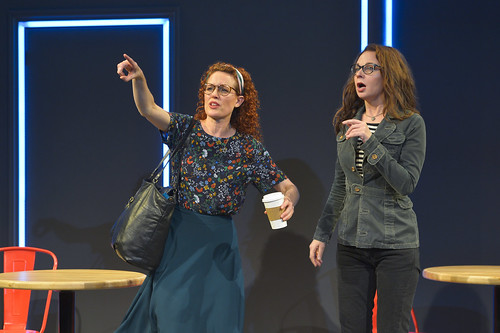
There are two problems with this. First, the rabbi, Naomi, has no idea what to do with the story or a way to discern what it tells her about the deceased that she might be able to share with the congregation. The second is that the story, as fables go, just isn’t compelling. Even when the view of the fable shifts to an entirely different take on it, there doesn’t seem to be much there there – certainly not enough upon which to build a play.
As Rabbi Naomi, the always-appealing Marilee Talkington has the daunting task of making her a believable character. She’s highly self-aware in that she knows what a bad rabbi she is. Her entire rabbinical career seems to have been undermined and irretrievably damaged by the upending of a bottle of kosher wine at a key moment in her training. As a result, she bumbles through her job, bemoaning how bad she is at it and how she occupies the lowest rung of rabbi service even though there’s supposedly no hierarchy among rabbis. But all that self-awareness doesn’t make her any less inept. If anything, it makes her worse.
We meet her in the throes of a blind date with a self-described “psychic adviser” (the enigmatic Michael Goorjian) who is not Jewish, though he said he was in his computer dating profile, and she is perturbed that he thought her job was “rabbit” due to either her typo or his misreading. Either way, it’s a terrible date, though it allows Naomi to let us know (the first of many times) what a bad rabbi she is. Then we get to see her ineptitude in action when she meets the Gold family. Marcus Gold (Julian López -Morillas seen in flashbacks) has died. His widow (a funny but under-used Sharon Lockwood) can only moan and cry. His best friend (Jarion Monroe) seethes with anger, and his daughter (a wry Susan Lynskey) is lost in the chaos of death and gets no comfort from her husband (Cassidy Brown).
In a forced bit of coincidence, Naomi’s blind date has a connection to the grieving family, one that involves that odd rabbit fable and an actor (the sublime Danny Scheie) hired to actually play the ghost of the rabbit. Even as time passes and bits of plot and character are revealed, the play never comes fully into focus, and the recurring motifs – the story of the Jews, “the phrase I would use is…,” sucking at your job, being haunted by old stories, the whole rabbit fable – become less impactful and more annoying.
But there are flashes of light in the writing, like a potent delineation between “nonsense” and “bullshit” made by one of the characters. And the frazzled Naomi gets off a good laugh with her response to the rabbit fable. Upon hearing that the humans ate the rabbit, she sputters, “Rabbit isn’t even kosher! They’re for gentiles and Easter. Jesus.” She also has the gall to say, during a moment of tension amid the grieving Golds, “This is a difficult time for all of us,” which is kind of hilarious.
It is a difficult time for all of us, Naomi. Would that there was some comfort – imaginary or otherwise – in this jumble of play.
FOR MORE INFORMATION
Daniel Handler’s Imaginary Comforts, or The Story of the Ghost of the Dead Rabbit continues through Nov. 19 in a Berkeley Repertory Theatre production at the Peet’s Theatre, 2025 Addison St., Berkeley. Tickets are $30-$97. Call 510-647-2900 or visit www.berkeleyrep.org.
